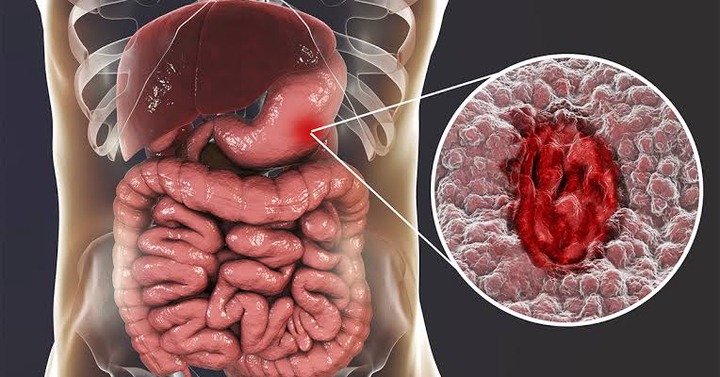Millions of people around the world suffer from stomach ulcers. In most cases, this is an infection caused by the bacteria Helicobacter Pylori and not by food or emotional tension, as is often thought.
In this article, you can find out how to spot the symptoms of a stomach ulcer and choose an appropriate treatment.
Important information about stomach ulcers
This is an injury to the membrane covering the stomach and the first part of the small intestine (duodenum). These injuries can occur in men and women equally. The main symptom of this problem is a burning sensation in the stomach and in the navel area, even though you have not eaten anything.
How to recognise a stomach ulcer?
It is good to recognise the symptoms of these lesions of the membrane in order to be able to resort to some natural remedies. Be very careful in case of:
Pain in the abdomen
Without having made any effort or having eaten too much, you will feel a kind of burning between the sternum and the navel. The intensity and duration of this pain can vary.
Usually this discomfort occurs between meals, when the stomach is emptying. The most correct description for ulcer symptoms is ‘burning in the belly’. The burning is most likely to occur during the night, when you are hungry or when it has been a long time since your last meal.
 Other symptoms
Other symptoms
As we have already mentioned, stomach ulcers are accompanied by different symptoms. It is very important to be careful and not to forget that the same symptoms do not always occur together (some may never occur). Some of the symptoms of ulcers include:
Excessive eating;
Excessive flatulence;
AdvertisementInability to drink liquids;
Feeling of a full stomach after not eating;
Sensation of appetite after eating;
Light nausea in the early hours of the morning;
Loss of appetite;
Feeling of general malaise;
Tiredness;
Weight loss.
Symptoms of a severe ulcer
If you don’t pay proper attention to the symptoms listed above and don’t follow any kind of treatment, natural or otherwise, ulcers become chronic and lead to:
 Vomiting (even with blood);
Vomiting (even with blood);
Dark, pasty, tarry-looking stools;
Blood in the stool;
Propensity to develop ulcers.
AdvertisementAlthough ulcers are caused by a bacterium, there are some people who are more vulnerable than others to developing this problem. Those most likely to get stomach ulcers are:
People already infected with the bacterium H. Pyroli or other bacteria.
People who take non-steroidal anti-inflammatory drugs very frequently. These include aspirin and ibuprofen.
People with a family history.
People who consume excessive alcohol.
Patients with kidney, lung or liver disease.
People over the age of 50.
Tips for preventing stomach ulcers
If you are starting to experience the symptoms of a stomach ulcer or are one of the people most likely to develop one, you need to change some of your habits. The best solution is prevention. Make sure you
Stop smoking
There is a relationship between the habit of smoking and the formation of ulcers, as well as with the failure of mucosal wounds to heal and the recurrence of them.
Avoiding foods harmful to the stomach
We are talking about foods that compromise stomach health and increase the chances of ulcers forming. Foods that are prohibited to prevent the development of these lesions include:
Advertisement Coffee;
Coffee;
Chocolate;
Alcohol;
Mint;
Tomato;
Fats;
Spicy foods;
Raw garlic;
Citrus fruits.
Avoiding medicines
Certain pills may help you cope with the pain, but they only make other symptoms worse in the case of an ulcer. For example, anti-inflammatory drugs for arthritis or muscle pain compromise the mucous membranes of the digestive system. Consult your doctor for alternatives or natural treatments.
Smoothies and remedies for stomach ulcers
If you have come to the conclusion that you have a stomach ulcer because you have recognised the symptoms, then you can follow some of these ideal home treatments for this problem:
 Mix 2 egg whites and 2 tablespoons of olive oil and drink the mixture on an empty stomach.
Mix 2 egg whites and 2 tablespoons of olive oil and drink the mixture on an empty stomach.
Make a juice with ½ green cabbage and 1 stalk of celery. Add water and sweeten with honey.
AdvertisementEat a cooked green banana every day.
Make a smoothie with 1 banana and 1 slice of papaya and drink the juice twice a day.
Eat wheat bran in various preparations.
Make a healing juice from ½ a kiwi and ¼ a melon. Add the necessary water and drink it on the spot.
Boil two tablespoons of chamomile and two tablespoons of lemon balm in a cup of water. Let it steep for 5 minutes, strain it and drink it after dinner.
Mix 1 tablespoon of Althaea officinalis and 1 tablespoon of ginger in a cup of boiling water. Let it sit for a few minutes and then drink the tea.
Prepare an infusion with 1 litre of water for every 2 tablespoons of fenugreek. Strain and sweeten with honey.
Chew well and swallow a spoonful of linseed. You can also grind them in a mortar or with a blender.
Make a smoothie with 2 peeled carrots and 1 leaf of white cabbage. Strain the juice and drink it between meals.
Use raw bee honey in various recipes, e.g. with toast or biscuits.


 Business5 days ago
Business5 days ago
 Politics5 days ago
Politics5 days ago
 Featured5 days ago
Featured5 days ago
 Business5 days ago
Business5 days ago
 Inspirational5 days ago
Inspirational5 days ago
 Latest4 days ago
Latest4 days ago
 Business6 days ago
Business6 days ago
 Education5 days ago
Education5 days ago



